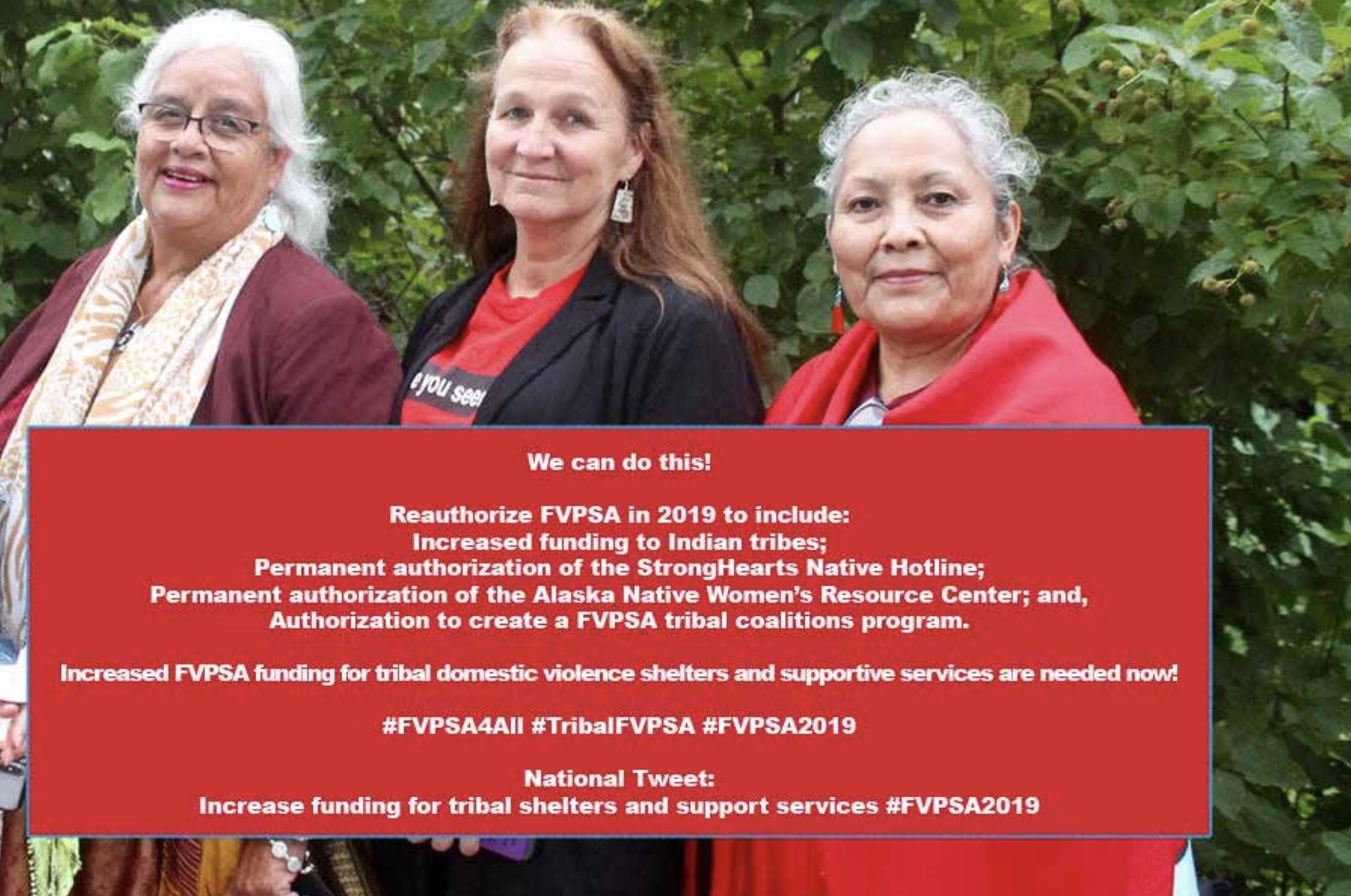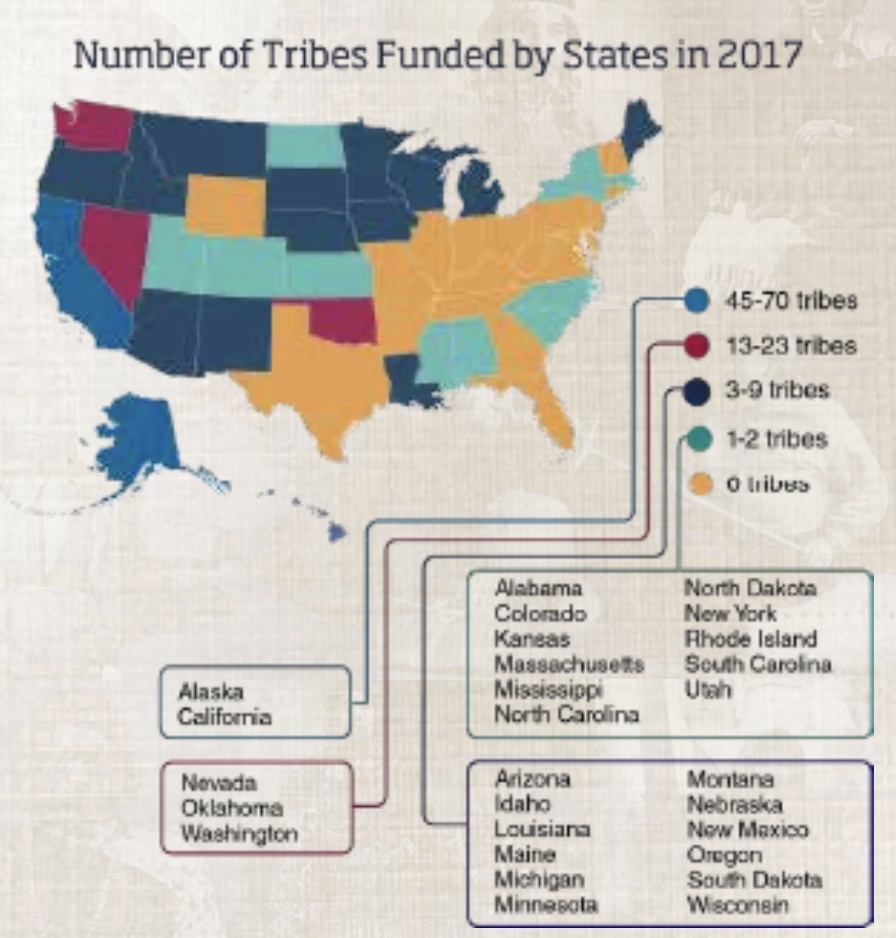Family Violence Prevention Services Act (FVPSA) FVPSA Has Expired and 2019 Reauthorization Is Needed!
The Family Violence Prevention and Services Act Grants to American Indian Tribes are formula grants funded through a 10% set aside under the FVPSA appropriation. FVPSA is the only federal grant dedicated to domestic violence shelter and supportive services. A tribal domestic violence shelter or safe home can provide Native women the support, advocacy and emergency services they need to escape abuse and violence.
“For a woman trying to escape, a domestic violence shelter may be her only option - if one is available. Housing and transportation are scarce across most of Indian Country, and domestic violence shelters are still rare,” said Brenda Hill, NIWRC Director of Training. “Leaving is complicated and more challenging when she has children, or other loved ones who are dependent. Women hide in fields, abandon houses, and many are forced to leave for a nearby city where there are other predators. They leave behind family, friends, jobs - connections to their community and culture in exchange for safety. Shelter programs can make the difference between life and death.”
FVPSA funds are also used for supportive services. Tribes have used FVPSA funds in efforts to increase public awareness, for supportive services for victims and their dependents, and services. Yet, despite these advances, funding and services remain nonexistent for over one-half of all Indian tribes and tribally based technical assistance must increase.
Three other essential tribal programs funded by FVPSA include the National Indigenous Women’s Resource Center (NIWRC) serving as the National Indian Resource Center, the Alaska Native Women’s Resource Center (AKNWRC) serving as the Alaska Native Tribal Resource Center providing assistance to the 229 Indian tribes in Alaska, and the StrongHearts Native Helpline the only national hotline that is tribally based. The last two programs are currently funded only through the FY 2019 Congressional appropriations. Unfortunately, funding for both of these programs is on a discretionary, non-permanent, basis.
FVPSA 2019 Recommendations
It is vital that the FVPSA be reauthorized in 2019. The overarching theme of our recommendations is based on one simple fact. Tribal governments, tribal coalitions, and tribal people are best equipped and situated to help American Indian and Alaska Native (AI/AN) survivors of domestic violence and abuse. The current breakdown of FVPSA funding allows AI/AN survivors to fall through the cracks and only by making tribal programs permanent (such as AKNWRC and Strong Hearts) and reallocating funding percentages to meet current needs can more AI/AN survivors be helped. The NCAI Task Force recommends four amendments to FVPSA to strengthen tribal capacity to provide shelter and supportive services by authorizing:
- An increase in the tribal government percentage to increase the reach of tribal services;
- Formula funding for the Alaska Native Women’s Resource Center to serve as the Alaska Native Tribal Resource Center on Domestic Violence;
- Permanent funding of the StrongHearts Native Helpline to serve as the National Indian Domestic Violence Helpline;
- Formula funding for the Tribal Domestic Violence Coalitions to provide training and technical assistance (TTA) similarly to what the State Domestic Violence Coalitions provide through a 3% set aside.
Increased Tribal Government Grant Program Funding from 10% to 15%
Prior to 1994 Alaska Tribes were not eligible for funding through FVPSA. In a Solicitor’s Opinion issued 1/11/1993, entitled “governmental Jurisdictional Alaska Native Villages Over Land and Nonmembers,” the Solicitor rejected the view that Alaska Native Villages were not tribes. As a result of this decision, roughly 220+ tribes were added to the FVPSA eligibility—nearly doubling the eligible tribes, but not increasing the amount available to tribes.
Permanent Authorization of the Alaska Native Tribal Resource Center on Domestic Violence supporting the Alaska Native Women’s Resource Center (AKNWRC)
Located in Fairbanks the AKNWRC serves as a technical assistance center for 229 Indian tribes in Alaska. The AKNWRC is committed to strengthening local, tribal government responses through community organizing efforts, advocating for the safety of Native women and children in their villages and homes, especially against domestic and gender-based violence. The AKNWRC provides assistance to Alaska Native villages through providing technical assistance and training, including needs assessments; public awareness/ resource development; policy development and systems advocacy/engagement; and, advocacy on an Alaska Native program of research and knowledge development.

Permanent Authorization of the StrongHearts Native Helpline
Trained with a strong understanding of Tribal cultures, sovereignty, and law, StrongHearts advocates offer one-on-one, peer-to-peer support, and referrals to local resources in a safe and healing environment. All calls are anonymous and confidential. To date, StrongHearts (1-844-7NATIVE) has received more than 1,400 calls from survivors, concerned family members and friends, service providers and more, helping to close the gap in culturally-appropriate resources for American Indians and Alaska Natives facing domestic violence. As the first culturally- appropriate domestic violence helpline specifically targeting Native Americans, StrongHearts is also expanding its staff of advocates to respond to callers, many of whom are seeking support as they navigate difficult barriers to justice and safety.
Creation and Permanent Authorization of a Tribal Coalitions Grant Program
Tribal Coalitions exist throughout Indian Country to provide culturally specific training, technical assistance, and support to tribal governments and tribal victim services providers in their respective service area. Currently, 18 tribal coalitions exist with more forming to address gaps in services and as need is demonstrated. A dedicated funding stream is needed under FVPSA to provide additional training, technical assistance, and support for the tribal governments. State governments are offered such a resource under FVPSA through the state coalitions program. State coalitions lack the expertise to provide such support to Indian tribes, and the creation of the tribal coalition program will fill this void. The overarching goal of Tribal Coalitions is to raise awareness, educate, and to provide culturally specific technical assistance, training, and services to advance and enhance the responses to crimes of domestic violence committed in Indian Country.
FVPSA’s Longstanding Support of Indian Women
First passed in 1984, the Family Violence Prevention and Services Act (FVPSA) continues as the primary federal funding source dedicated to providing immediate shelter and supportive services for victims of family violence, domestic violence, or dating violence and their dependents. For over a decade it was the only funding for tribal domestic violence shelter programs. While limited the FVPSA support of tribally based services has and continues to provide meaningful resources where often none exist.
“While we work to fix a broken system, victims need shelter and services today to stay alive,” said Tami Truett Jerue, Director, Alaska Native Women’s Resource Center. “My home in our village was a safe home and I served as the director of a Native women’s coalition which operated a Native shelter in Fairbanks. I know first-hand the importance of FVPSA funding. I also know the FVPSA program could do so much more with increased funding.”
 Funding Under the FVPSA 2019 Reauthorization Must Increase
Funding Under the FVPSA 2019 Reauthorization Must Increase
While all federally recognized Indian tribes are eligible to apply for tribal FVPSA funding the program currently does not. “Typically, the largest number of tribes funded are in Alaska and California (between 45 to 70 tribes), followed by Nevada, Oklahoma, and Washington (13 to 23 tribes). All other states have fewer than ten tribes funded through FVPSA. To meet the need for shelter, tribal programs contract with hotels, utilize safe homes, and access non-native shelters outside of their villages, communities, and reservations.”1
1. https://www.acf.hhs.gov/sites/default/files/fysb/fvpsa_tribaldvservices_071818_508.pdf.





